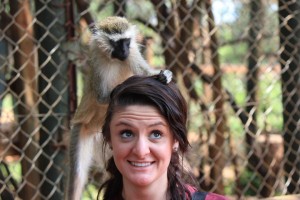Jambo, my name is Jasper and I am a Red Lodge, MT native. Obviously hailing from MT, I do not often greet folks with a friendly jambo, which is Swahili for “hello,” however, I just returned from an African adventure through UW’s College of Agriculture and Natural Resources Plant Science department. I may have only picked up a few words of Swahili, but I learned more than I ever expected about Kenyan culture, particularly agriculture and the major differences between American and African processes.
This was a 2 week trip, starting on December 8 and ending on December 22, 2011. Our group consisted of about 18 people. We spent our time seeing the “real” Kenya. From local farms to tea plantations to elephants and giraffes, there wasn’t a single aspect of Kenya we missed.
Our first few days were dedicated to visiting the greater Nairobi area. Feeding giraffes with your mouth and petting cheetahs were just a few of the exciting moments we experienced. We also spent time learning about different agriculture practices such as intercropping, double digging, and grafting. Many of these practices are also used in American Agriculture, however on a much larger and more advanced level.
Our next few days were spent driving the Kenyan country side, taking in the sights and stopping at amazing sites such as Finlay’s Tea plantation, where we saw how tea was made from on the stem to in the cup. Another fascinating stop was Manor House Agriculture College, where we learned to use a moldboard plow and donkey team as well as traditional agriculture techniques such as double digging and staggered row spacing.
 Our final days were spent in Maasai Mara Game Reserve bumping across the beautiful African Landscape, observing wildlife and other interesting creatures called “tourists.” From African Lions to zebras we saw so many amazing animals. We also had the opportunity to learn about the indigenous culture of the Maasai people. Ornately decorated in beaded jewelry and generally dressed in red cloth, these villages were so beautiful and teeming with activity. Traditional African lifestyles are still honored in this culture and it was truly a once in a lifetime experience to observe and take part in something so historically valuable.
Our final days were spent in Maasai Mara Game Reserve bumping across the beautiful African Landscape, observing wildlife and other interesting creatures called “tourists.” From African Lions to zebras we saw so many amazing animals. We also had the opportunity to learn about the indigenous culture of the Maasai people. Ornately decorated in beaded jewelry and generally dressed in red cloth, these villages were so beautiful and teeming with activity. Traditional African lifestyles are still honored in this culture and it was truly a once in a lifetime experience to observe and take part in something so historically valuable.
This trip was easily the pinnacle of my studies at UW. We often take for granted what blessings we have living in the US, and experiencing the lifestyles of different cultures is a valuable asset in life. We are incredibly lucky to have such a supportive faculty and staff at the College of Ag and Natural Resources, who encourage students to get out and take field study options such as Karibu Kenya. I highly encourage anyone who is interested in a study abroad opportunity to seize it, you certainly will not regret it!
